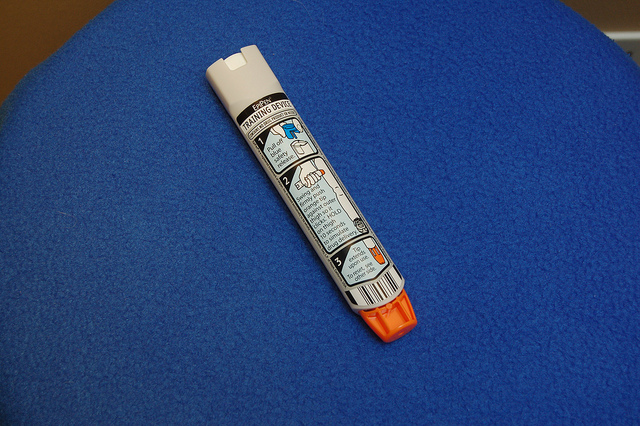U.S. Food and Drug Administration (FDA)
See the following -
Documents Reveal How Poultry Firms Systematically Feed Antibiotics To Flocks
Major U.S. poultry firms are administering antibiotics to their flocks far more pervasively than regulators realize, posing a potential risk to human health. Internal records examined by Reuters reveal that some of the nation’s largest poultry producers routinely feed chickens an array of antibiotics – not just when sickness strikes, but as a standard practice over most of the birds’ lives...
- Login to post comments
Elizabeth Warren's "Pharma Swear Jar" Idea
Elizabeth Warren has come out with a proposal for what she's calling a "pharmaceutical swear jar". Once a drug company had been fined, this bill would earmark a percentage of their profits over a multiyear period for use in NIH funding...
- Login to post comments
Epipen: A Sign of a Broken Healthcare System
 It has been going on for years. The difference is that now the media is hopping on the story. Now America is paying attention. In 2015, the price of doxycycline, a generic antibiotic, was up to $5 per pill, an increase from $0.03 in 2014. The antibiotic is the gold standard treatment for Lyme disease. In 2015, the price of Daraprim (pyrimethamine), was up to $750 per pill, an increase from $13.50. The antiparasitic medication is used to toxoplasmosis, an infection acquired in people who have HIV/AIDS...
It has been going on for years. The difference is that now the media is hopping on the story. Now America is paying attention. In 2015, the price of doxycycline, a generic antibiotic, was up to $5 per pill, an increase from $0.03 in 2014. The antibiotic is the gold standard treatment for Lyme disease. In 2015, the price of Daraprim (pyrimethamine), was up to $750 per pill, an increase from $13.50. The antiparasitic medication is used to toxoplasmosis, an infection acquired in people who have HIV/AIDS...
- Login to post comments
Factory Farms Sow Superbugs
Imagine a world where a scraped knee on a playground could have deadly complications. A world where chemotherapy and radiation are less effective cancer treatments because of increasingly common post-treatment infections, or where lifesaving drugs we regularly rely on today no longer heal people...
- Login to post comments
Farmers Giving Livestock More Antibiotics Despite Superbug Threat
The sale of antibiotics for livestock increased 16 percent from 2009 to 2012 in a trend that has troubling implications for resistance in humans, according to the Food and Drug Administration...
- Login to post comments
FDA Approves First Robotic Exoskeleton For Paralyzed Users
...the United States Food and Drug Administration approved ReWalk Robotics' personal exoskeleton for marketing in the U.S...
- Login to post comments
FDA Embracing Cloud, APIs In OpenFDA Initiative
The U.S. Food and Drug Administration is leveraging the cloud as part of its openFDA initiative to make data on recalls and adverse events easily accessible to software developers and researchers...
- Login to post comments
FDA Has Vetted Just Seven Percent Of Animal Antibiotics For Superbug Risk
Scientists fear the widespread use of antibiotics on the farm may be a factor in the rise of "superbugs" – bacteria that grow resistant to drugs, infect humans and defy conventional medicines. Amid these concerns, the U.S. Food and Drug Administration has come under pressure to curb antibiotic use in farm animals. In 2003, the agency announced plans to evaluate every new animal drug based on the drug's potential to create superbugs...
- Login to post comments
FDA Offers Final Guidance For Medical Device Cybersecurity
The U.S. Food and Drug Administration posted newly-minted recommendations for protecting medical devices from attackers...
- Login to post comments
FDA Releases Device Adverse Event API
Under its openFDA project, the U.S. Food and Drug Administration has released a new application programming interface that returns data from its Manufacturer and User Facility Device Experience (MAUDE), an FDA dataset that contains medical device adverse event reports...
- Login to post comments
FDA Won't Regulate Medical Device Data Systems
Draft guidance published Friday by the U.S. Food and Drug Administration seemingly paves the way for smoother medical device interoperability by lowering the burden on developers of medical device data systems (MDDS) to comply with agency requirements...
- Login to post comments
Federal Open Source Is Messy - And That's OK
Open source projects like the National Library of Medicine's Pillbox show potential of open innovation -- including competition with projects started elsewhere...
- Login to post comments
Federal Prize Competition Seeks Innovative Ideas to Combat Antimicrobial Resistance
A federal prize competition launched today is calling for innovative ideas for rapid, point-of-care laboratory diagnostic tests to combat the development and spread of drug resistant bacteria, a rising public health threat. Antibiotic resistant bacteria cause at least 2 million infections and 23,000 deaths each year in the United States, according to the Centers for Disease Control and Prevention. The Antimicrobial Resistance Diagnostic Challenge will award $20 million in prizes over all phases of the competition for new, innovative and novel laboratory diagnostic tests...
- Login to post comments
Feds Investigating Two Dozen Potential Hacks Targeting Life-Saving Medical Devices
A senior official at the Department of Homeland Security tells Reuters that government experts are now investigating upwards of two dozen instances in which high-tech medical products may be prone to hackers...
- Login to post comments
Four Lessons In The Adoption Of Machine Learning In Health Care
The March issue of Health Affairs demonstrates the potential of health care delivery system innovation to improve value for both patients and clinicians. Technology innovations such as machine learning and artificial intelligence systems are promising breakthroughs to improve diagnostic accuracy, tailor treatments, and even eventually replace work performed by clinicians, especially that of radiologists and pathologists. Machine-learning systems infer patterns, relationships, and rules directly from large volumes of data in ways that can far exceed human cognitive capacities...
- Login to post comments